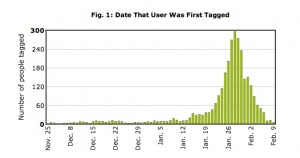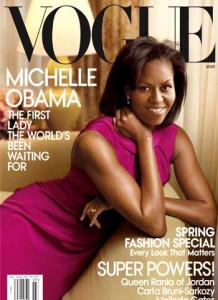Fascinating piece in Slate by Chris Wilson.
Late last fall, a chain letter titled “16 Random Things About Me” began to chew its way through Facebook. The author of one of these notes would itemize her personality into ’16 random things, facts, habits, or goals,’ then tag 16 friends who would be prompted to write their own lists. And so on and so on. Similar navel-gazing letters had popped up over the years through e-mail and on blogs, MySpace, Friendster, and the venerable blogging site LiveJournal. The Facebook strain had a good run, but by the end of 2008 it appeared to have stagnated.
Then something curious happened: It mutated. Since everyone who participates is supposed to paste the original instructions into her own note, it’s easy to tinker with the rules. Soon enough, 16 things (and 16 tagged friends) morphed into 15—and 17 and 22 and 35 and even 100. As the structure crumbled, more users toyed with the boundaries. Like any disease, ‘Random Things’ was mutating in hopes of finding a strain that uniquely suited its host. In this case, the right number was vital to its survival: The more people who are tagged, the more likely the note is to spread. The longer the list, though, the more daunting it is to compose and the fewer participants will be roped in.
By mid-to-late January, “25 Random Things About Me” had warded off its competitors. Once the letter settled on 25 things (a perfect square, just like 16) the phenomenon exploded. The data we collected reveal a clear tipping point around this time.
The article has a couple of intriguing charts — e.g.

Wilson showed his data to an epidemiologist who told him that they displayed the “classic exponential growth of an epidemic curve.” Her view was that
’25 Things’ authors can be seen as ‘contagious’ under what’s known as a ‘susceptible-infected-recovered’ model for the spread of disease. Think of ’25 Things’ authors as being contagious for one day—the day they tag a bunch of their friends.
She found that, for that one day, the growth parameter of the ’25 Things’ disease during its ascent phase (roughly until the beginning of February) was 0.27. This means that, on average, each ’25 Things’ writer inspired 1.27 new notes.
It’s ironic that I came on this on Darwin’s birthday. What it suggests is that there was something about 25 things that made that particular variation ‘fitter’ than its competitors. I’m surprised — I would have predicted that a smaller number — seven perhaps — would have been more likely to triumph. But maybe FaceBookers have more interesting lives than mere bloggers.
Even more ironic is the fact that the Pew Forum on Religion and Public Life today reported that 63% of Americans reject Darwin’s theory of evolution by natural selection.
What a strange country is the US.




